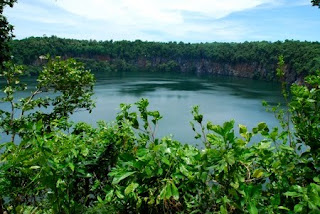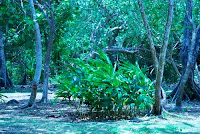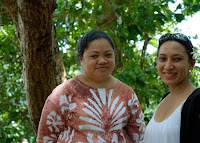
67 Years Ago
Living in a tent for fifteen months at the edge of a lake filled with eels is a memory Joe Mullins hasn’t forgotten. He came to the island of Uvea a self described green eighteen year old from Chicago’s South Side in 1942, one of 5,000 U.S. Marines sent to serve during World War II. Joe was stationed at Lake Lalolalo in Uvea’s interior with twelve other Marines. American forces were deployed to this remote South Pacific island to protect the region from a Japanese invasion. Uvea, also known as Wallis Island measures nine miles long by five miles wide
Mom met Joe in Hawaii when their journalism paths crossed. One conversation with Joe about the exotic faraway island where he served during the war and you guessed it she was off to Uvea, arriving 27 years later.
What would it take to realize our dreams? At 86, Joe’s dream was to return to Uvea. Between mom’s forty year reunion in Keiyasi and Joe’s 67 years—I allowed myself to contemplate the passage of time, grateful for being a witness and a participant to history.
We met Joe in Nadi, Fiji. I was startled to find a sleek Czech Airlines aircraft sitting at our gate and asked if we were on the correct flight. Ah! One of the pleasures of traveling are these startling moments, along with completing your immigration form when you’re half asleep and jetlagged that asks have you ever committed a felony or are you bringing in food of any kind, or have you been on a farm in Africa or South America in the past seven days?
Yes, we were on the right flight, I was told. But…the single aircraft normally used for this route, operated by Air Caledonie and based in Noumea was undergoing an annual inspection in Hong Kong.
The Czech Airlines aircraft had been rented for the month, staffed by French and Czech flight attendants. We couldn’t be farther from the Czech Republic sitting on a runway in Nadi, Fiji heading to a tiny island in the middle of the Pacific Ocean, I laughed wondering about the journey of things. What an interconnected world!
Joe gazed out the window busy clicking the snap button on his camera from 32,000 tropical feet and forwarding the film spool. I observed him. The veins in his hands like ridges, his craggy profile and eyes the icy blue of a menthol vapor drop. His hair--white shadowed gray and straight, fell to one side. His posture straight with slightly hunched shoulders from carrying his six-foot lanky frame. He wore a white long sleeved shirt and putty cargos. I imagined what he looked like in his youth. Have you done this -- imagine what older people look like in their youth? One day it will be the reverse.
Mom requested wheelchair assistance at the airport but Joe refused: “I will not return to Uvea with help, I want to walk on my own.”
What a remarkable privilege this is, I thought. 67 years. It is incredible to grasp. I’m still collecting and cataloguing my experiences. Hope I’ve got the spunk to travel when I’m in my 80’s. Seems like there’s so much to learn between the bookends of each decade, much to read, and many dots to connect in our quest for the meaning of our lives. How many experiences are waiting for each of us.
As we came into view of the narrow air strip, Joe turned to me. “I helped to build this runway,” he smiled.
Arrival
When we arrived at the tiny air terminal in Wallis, I could tell how hot (temperature wise) it was by looking at the uniforms of the French immigration officials. Pale baby blue short sleeved shirts and very short navy blue shorts.
We walked into a sea of relatives greeting each other. A few women and children walked towards us gently placing Tiare Tahiti leis around our neck. The lei was a bundle of white, interspersed with red flowers, heavy with the scent of love. Tiare Tahiti is one of those prized gifts from nature that I hope you have a chance to experience. There is something very sensual about this flower—maybe it’s an island thing but I loved wearing one tucked behind my ear in high school and strolling down the beach with my friend Mapu, hoping for a double take from the surfers...
There were no words exchanged except for the quiet recognition of Sosepho, Sosepho (Uvean, for Joseph). We piled into two trucks (luggage and kids in the back of the open bed truck) and headed for the section of the island known as Mata Utu where we would be staying. A girl of about nine or ten with wavy brown hair sat next to me smiling. I realized if I wanted to have a conversation with little Mele and her cousins I’d have to recall my high school French which surprisingly came back albeit a little fractured. Thank goodness children are forgiving, correcting my faux-pas when I tripped over my words.
Some friendships are born of the most unique circumstances. We were hosted by the family of Marie Michelle one of the daughters of Fosio Taukapa. During wartime, Joe was befriended by Fosio’s father who worked on a plantation and supplemented his income by washing the marines’ laundry. The friendship developed and Fosio’s father taught Joe the language of Uvean. And the young man from the South Side of Chicago became one of only a handful of marines to master the language at that time.

We had been invited for dinner that evening. The house of Marie Michelle appeared as though it was carved out of the forest. We took our seats; children at one table and adults at the other. For a moment, I wished I could sit with the kids. No joke. There was giggling and a lightness that I was drawn to. The table was a feast of fresh fish, sausage, barbecue chicken, taro, potato, corn, and crab salad, made by Stella, (another daughter of Fosio), a crisp green salad, and a bottle of smooth French red wine. “Do you always eat like this?” mom asked. “No, we have prepared this especially for you.”
This is something I’ve experienced with islanders, their hospitality and gracious spirit, with playful delight, without expectation. One truly feels you will be taken care of. The security of that feeling is precious. After reminiscing and marveling at Joe’s speaking Uvean and French, we topped off the evening with French vanilla ice cream. In the hot tropics it tasted extra nice. Eduardo, a son in law of Fosio, asked if Joe would come and speak to his class about his experience in Uvea during the war. Mom volunteered that I would be happy to give a hula lesson (thanks mom). Eduardo jumped on it acknowledging that the kids were big fans of Disney’s Hawaiian themed Lilo and Stitch.

The Lake of Mystery
The next morning, Marie Michelle’s sister Noella picked us u
p for a visit to Lake Lalolalo. I was anxious to see the mysterious place that Joe described in the Uvea chapter of mom’s book and happy to be on a new adventure. My mind tried to piece together the thought of young marines camping out here. Far, isolated, from their lives back home. How different my life was when I was their age. I was enrolling in classes for college, where the hardest decision was how heavy a course load I could handle. The young Marines decades ahead help build basic infrastructure for a community.
The lake was a perfectly round deep crater filled with clear pine green water. Black birds flew across the sky. My eyes traced the edges and I thought about how scary it might have been for Joe. He shared with me that for security reasons he was not allowed to burn fires, take photos, or use lights at night. The men took turns patrolling the camp at night alert to the slightest movement amidst fruit bats, birds, boars, wildlife, and thick jungle. The slightest movement or hint of rustling in the darkness of night would be frightening especially to a young marine unused to the sounds of a jungle.

I fumbled with my Nikon digital SLR which I am forever learning to use. “You take too long to take a photo,” mom chastised me. “You’re going to lose the photo op messing with all the settings.”
I know. I know. But maybe I’ll get one good shot. I cursed the viewfinder and LCD screen. Can you imagine the days when our parents had to just risk it, not knowing whether it was a good picture until the film was developed?

Noella, smiled patiently. “Before you could not drive here, now you can drive almost up to the edge of the lake.” That was a definite change since my mom and Joe had been here. During those days— you had to hike to reach the lake. And if you were really brave you slid down on a rope and went for a swim.
Noella and Levani
Earlier that morning I shared a coffee on the veranda of our hotel with Joe captivated by his stories and wisdom. The memory of his times in Uvea are close. He doesn’t live in the past, but respects it. “Many of my colleagues still live as if it’s 1942,” Joe shared with me. He was glad to be keeping with the times learning to use the Internet, (in fact he researched the flights for us to get to Wallis).
In addition to a lifelong study of the Uvean language and culture, he speaks fluent Polish and is studying Catalan and French. Joe decided to stay back during our visit to Lake Lalolalo because he wanted to prepare “some notes for my lecture to the class.” Like a college student, English-French dictionary in one hand and a red pen in the other—I watched for a few moments as he hand wrote a short course in the history of World War II for a class of ten year olds... (continued on the blog titled Uvea: Part 2)




No comments:
Post a Comment